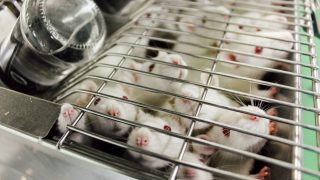
Promote Alternatives to Cosmetics and Product Testing on Animals (Massachusetts)
S.D. 1640/H.D. 1914
Bill would require manufacturers and their contract testing facilities to use methods that replace animal testing of products and ingredients for cosmetics, household cleaners, and industrial chemicals.
Status
The Animal Legal Defense Fund supports this bill.
Sponsors: Senator Mark Montigny (D-Second Bristol and Plymouth), Representative Jack Patrick Lewis (D-7th Middlesex)
Introduction Date: Introduced in the 2025-26 legislative session
Despite widespread public opposition and the availability of highly effective alternatives, tens of thousands of animals still suffer from cosmetics and product testing every year in the U.S.
Massachusetts lawmakers are considering legislation to address unnecessary experiments within the Commonwealth. An Act promoting humane cosmetics and other household products by limiting the use of animal testing (S.D. 1640/H.D. 1914), would require manufacturers and testing laboratories in Massachusetts to use modern, non-animal test methods, when available, to assess the safety of products such as household cleaners, industrial chemicals, pesticides, and cosmetics. Non-animal test methods provide equivalent or better scientific quality and relevance, and are typically faster and less expensive. This legislation does not apply to testing done for medical research, including the testing of pharmaceutical products and medical devices.
If you live in Massachusetts, please urge your state legislators to co-sponsor this legislation.
Why is this legislation important?
Animals needlessly suffer and die in product tests. Tens of thousands of animals every year are subjected to painful tests where, for example, harsh chemicals are applied to their eyes and skin. Mice and rats, which make up 95% of the animals used in science, are excluded from even the minimal protections provided under the federal Animal Welfare Act. Animal tests do not ensure human safety. Animal testing methods have serious scientific limitations. Results are often unreliable predictors of human outcomes; different species—and even sexes or sub-species—can react differently to the same substances. Alternative methods are more likely to provide accurate, human-relevant results. Non-animal testing methods also tend to be faster and less expensive.
Learn more about Massachusetts’ laws protecting animals and find more opportunities to take action at aldf.org/massachusetts.

